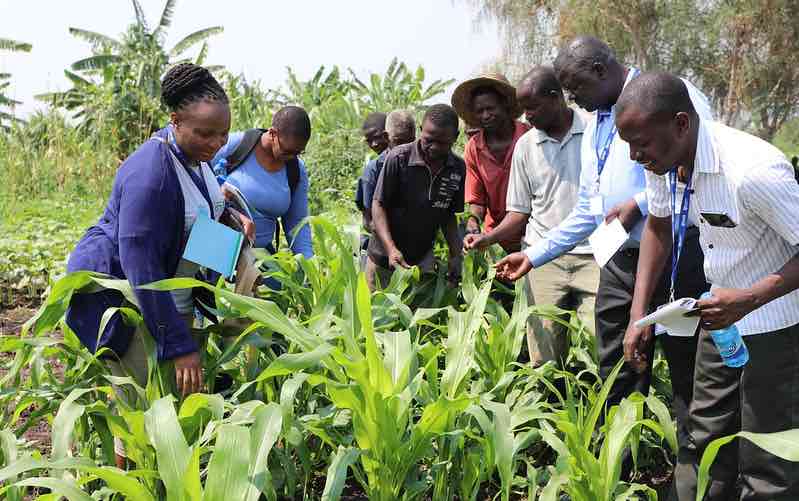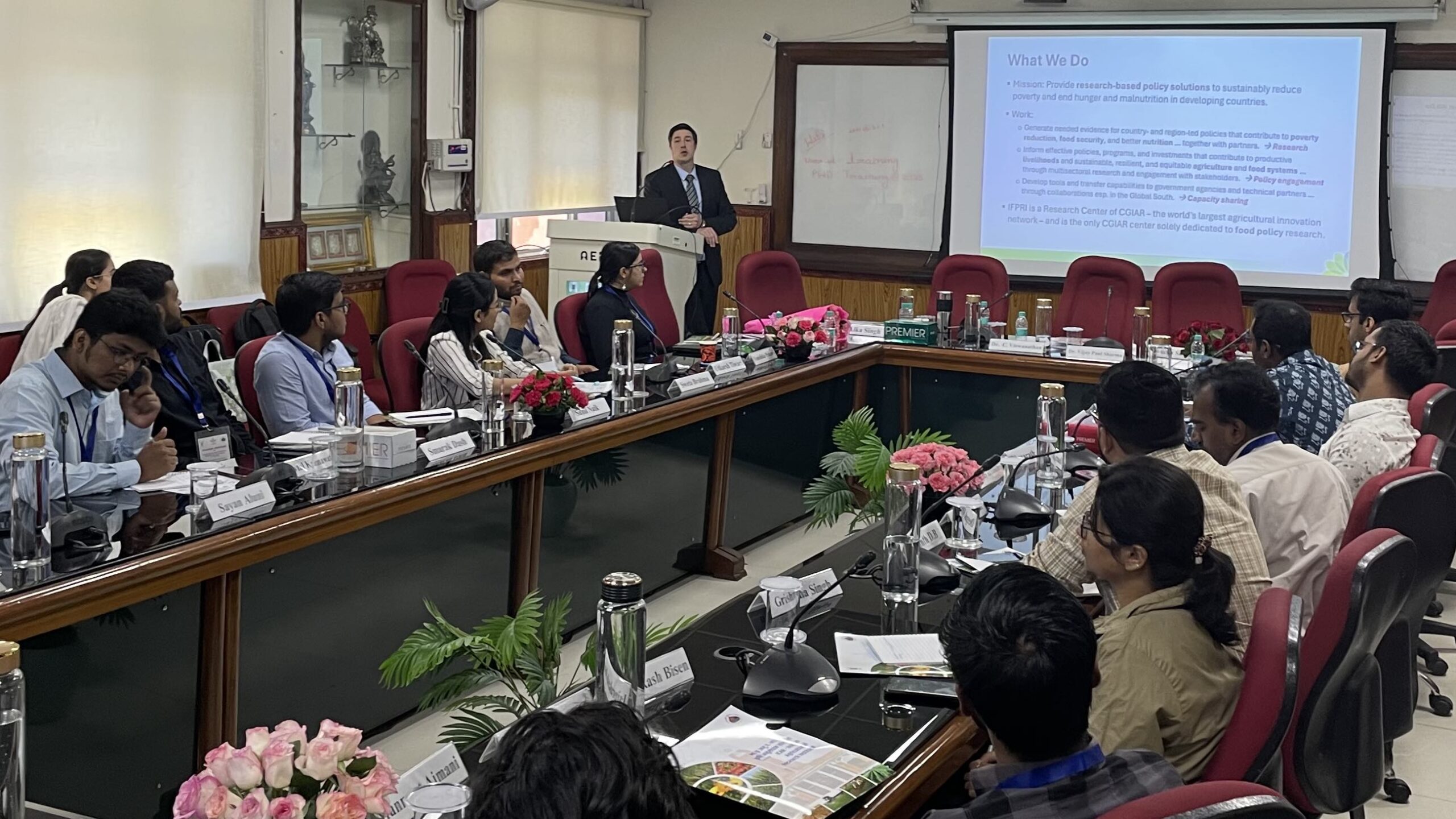First in a two-part series on IFPRI Malawi’s Bunda Grant Scheme mentorship program. Read part 2 here.
There are many ways to learn. One of the most personal is mentorship. In 2012, IFPRI Malawi partnered with the Lilongwe University of Agriculture and Natural Resources (LUANAR) to offer mentorship and capacity building to promising young master’s students at its Bunda campus. Funded by USAID, this program is called the Bunda Grant Scheme (BGS). Since then, IFPRI researchers have been offering selected master’s students from the Department of Agricultural and Applied Economics technical support on their thesis research and a forum to present and receive practical feedback on their research. Students may also submit their papers for publication in IFPRI Malawi’s Working Paper series. To date, 12 students from five cohorts have published in the series. Two of them, the subjects of this blog series, have also published their papers in reputable journals.
Joanna Chilemba
Joanna Chilemba, from the 2017/2018 cohort, is a proud mother of two boys and a girl. She comes from Chamadenga village, Traditional Authority (T/A) Chadza, in Lilongwe. She has worked as an agribusiness specialist for the Ministry of Agriculture and Food Security at the Dedza district office for nine years. In 2015, she began a master’s degree in agricultural economics at LUANAR. For her thesis, she investigated the impact of farmer business school (FBS) participation on farm income. When Joanna, along with six other fellow students, presented her research proposal at the university, her idea caught the interest of IFPRI researchers present. A few weeks later, she received an email that she was among three students to receive a research grant. “I did not know about the Bunda Grant Scheme program until I received an email from IFPRI,” she said.
“I had a goal of finishing my master’s program in exactly two years. And the funds helped me to achieve this goal.”
Joanna’s proposed research theme linked very well with an ongoing IFPRI project on Malawi’s pluralistic extension system, and so Joanna was introduced to project leader Catherine Ragasa, an agricultural economist based at IFPRI headquarters in Washington, D.C., whose research focuses on mixed quantitative and qualitative analysis of policies, institutions and technologies affecting innovation, productivity growth, and agricultural transformation. Being familiar with Malawi and having additional funding available for data collection, Catherine was the perfect match. “I had a goal of finishing my master’s program in exactly two years. And the funds helped me to achieve this goal,” said Joanna.

Catherine Ragasa
Having a mentor outside the university gave her access to an international network of experts in additional to her three LUANAR thesis supervisors. This pushed Joanna to improve her writing skills to match international standards. As a mentor, Catherine treated Joanna as a professional and not as a student.
Catherine and Joanna met frequently online and four times in person during the mentorship. Their meetings were not only a space for feedback and assistance on scientific approaches but also for emotional support. Joanna remembered: “one time when I almost blew up because of pressure, I wrote an email to her giving up, saying it is too much, I cannot handle it. Her response was so lovely, comforting and encouraging.”
“Without Catherine’s guidance I do not think I would have published my paper.”
Catherine admired Joanna’s commitment to her project and her ability to balance it with her many family obligations. Joanna always had a drive to learn and improve her skills, Catherine said.
Not every BGS participant manages to turn their thesis into a paper. The biggest challenge for Joanna was the fear of not meeting the deadline. “I even heard rumors that the grant was diverted to another student,” she said. But this only made her redouble her data collection efforts. “I wanted to prove that I can make it on time.”
The farmer business school program, implemented nationally by the government since 2011, consists of one year of group training and learning sessions focusing on improving market access and establishing profitable agribusiness ventures. Joanna’s study collected data from 455 smallholder farmers in the Dedza area, including 162 FBS graduates, 84 FBS dropouts, and 209 non-participants. The study found a positive yet small impact of FBS participation on crop income and production (US$20 per year on average), and no significant difference in crop income and production for farmers who graduated from FBS vs. those who dropped out. Insights from the qualitative research component of her study highlighted mixed perceptions of FBS, as participants gained knowledge but were not always able to translate this into increased production and incomes.
Looking back on her mentorship, Joanna said, “the journey was a thrill. Each day that I worked with Catherine brought something new, added value to my knowledge and research skills.”
The program means a significant investment for both mentee and mentor, and a clear goal helps both to stick with the process—in this case, publishing the research paper in a journal. The first step, and a proud moment, occurred when Joanna presented her preliminary research findings at the Malawi Forum for Agricultural Advisory Services (MaFAAS) extension week in June 2017. Soon after, she graduated, successfully defended her thesis, and worked hard with Catherine to further develop her research into a working paper. In Sept. 2019, the paper was accepted for publication by the European Journal of Development Research. This made Joanna the first BGS participant to publish a paper in a reputable international journal. “Without Catherine’s guidance, I do not think I would have published my paper,” she said.
The mentorship program was important for both. Joanna profited from Catherine’s international expertise and support in difficult times when things felt overwhelming. Catherine was able to integrate the mentorship into her ongoing research and the publication helped to spread this research to a wider audience. Looking forward, both will continue to work together. Joanna intends to expand her research into a thesis for a PhD, and she plans to involve Catherine in the work.
Interviews for this blog series were conducted by IFPRI-Malawi’s Sandra Fröbe-Kaltenbach, Communications Specialist, and Cynthia Kazembe, Research and Communications Assistant. This post also appears on the IFPRI-Malawi blog.







